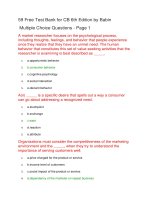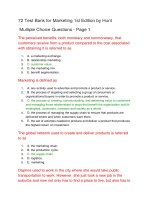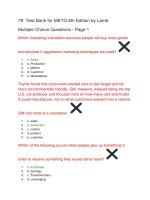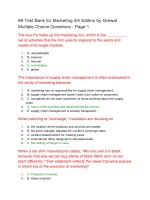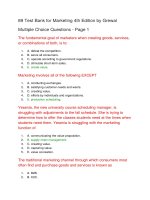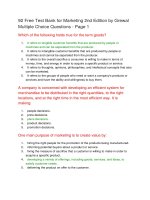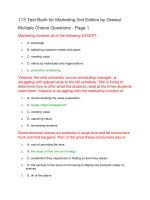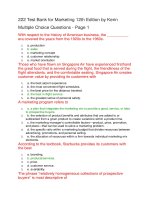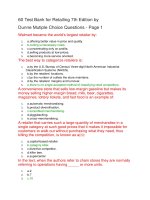Test bank for PSYCH 4th edition by rathus
Bạn đang xem bản rút gọn của tài liệu. Xem và tải ngay bản đầy đủ của tài liệu tại đây (262.92 KB, 21 trang )
Test Bank for PSYCH 4th Edition by Rathus
Full
file at />Name:
Class:
Date:
Chapter 01- What Is Psychology
1. Paulina is a kindergarten teacher. Every time one of her students answers correctly during her alphabet classes, she
uses phrases like "Well done" and "Keep it up." Her behavior provides an example of reinforcement.
a. True
b. False
ANSWER: True
2. A random sample is selected so that identified subgroups in the population are represented proportionately in the
sample.
a. True
b. False
ANSWER: False
3. Many case studies are clinical; that is, they are descriptions of a person's psychological problems and how a
psychologist treated them.
a. True
b. False
ANSWER: True
4. In a study conducted to test the effect of light on concentration, one group of students sat in a brightly lit classroom
while the other group sat in a regular classroom. The latter would be considered as an experimental group.
a. True
b. False
ANSWER: False
5. The cognitive tradition has roots in Socrates' advice to "Know thyself" and in his suggested method of introspection.
a. True
b. False
ANSWER: True
6. Gestalt psychologists believe that maladaptive behavior patterns tend to drop out and only the fittest behavior
patterns survive.
a. True
b. False
ANSWER: False
7. Structuralists tended to ask, "How do behavior and mental processes help people adapt to the requirements of their
lives?"
a. True
b. False
ANSWER: False
Copyright Cengage Learning. Powered by Cognero.
Full file at />
Page 1
Test Bank for PSYCH 4th Edition by Rathus
Full
file at />Name:
Class:
Date:
Chapter 01- What Is Psychology
8. Case studies are subject to inaccuracies.
a. True
b. False
ANSWER: True
9. Sociocultural psychologists study those things we refer to as the mind.
a. True
b. False
ANSWER: False
10. As opposed to a dependent variable, an independent variable is manipulated by the experimenters so that its effects
may be determined.
a. True
b. False
ANSWER: True
11. Debriefing is the process of explaining the purposes and methods of a completed procedure to a participant.
a. True
b. False
ANSWER: True
12. When following the scientific method, psychologists usually begin a study by:
a. formulating a research question.
b. testing the hypothesis.
c. calculating correlations.
d. modifying theories.
ANSWER: a
13. Which of the following statements is true of functionalists?
a. They focus on learning observable behavior.
b. They tend to perceive separate pieces of information as integrated wholes depending on the contexts in which
they occur.
c. They attempt to break conscious experience down into objective sensations and subjective feelings.
d. They focus on behavior as well as the mind or consciousness.
ANSWER: d
Copyright Cengage Learning. Powered by Cognero.
Full file at />
Page 2
Test Bank for PSYCH 4th Edition by Rathus
Full
file at />Name:
Class:
Date:
Chapter 01- What Is Psychology
14. Which of the following statements is true of structuralism?
a. Structuralism argues that the mind consists of three basic elements: sensations, feelings, and images.
b. Structuralism focuses on how experience helps people function more adaptively in their environments.
c. Structuralism focuses on the study of observable behavior.
d. Structuralists focus on perception and how perception influences thinking and problem solving.
ANSWER: a
15. Which of the following statements was proposed by the functionalists?
a. The mind functions by combining objective and subjective elements of experience.
b. Remarkable combinations of behaviors can be taught by means of reinforcement.
c. Adaptive behavior patterns are learned and maintained.
d. Our lives are governed by unconscious ideas and impulses that originate in childhood conflicts.
ANSWER: c
16. Which of the following terms refers to contemporary psychologists who follow theories derived from Freud?
a. Anthropologists
b. Neoanalysts
c. Microanalysts
d. Ethologists
ANSWER: b
17. Which of the following is an important factor emphasized by the sociocultural perspective in understanding behavior
and mental processes?
a. Altruism
b. Gender
c. Reinforcement
d. Unconscious drive
ANSWER: b
18. Which of the following statements is true of applied research?
a. It is has been characterized as research for its own sake.
b. It is designed to find solutions to particular problems.
c. It has no immediate application to personal or social problems.
d. It is broad and nonspecific in its approach.
ANSWER: b
Copyright Cengage Learning. Powered by Cognero.
Full file at />
Page 3
Test Bank for PSYCH 4th Edition by Rathus
Full
file at />Name:
Class:
Date:
Chapter 01- What Is Psychology
19. Julie's research work requires her to interview a sample of 200 people within two months. She needs a quick method
of observation by which she can consolidate the data from her questionnaires without taking too much time. Which
of the following methods should be recommended for Julie?
a. The survey method
b. The case study method
c. Naturalistic observation method
d. Field experiments
ANSWER: a
20. Which of the following statements is true about the different types of psychologists?
a. Counseling psychologists have clients with serious psychological disorders.
b. Clinical psychologists help clients resolve problems and change self-defeating behavior.
c. School psychologists focus on planning instructional methods for a school system rather than on individual
children.
d. Health psychologists apply psychology to the criminal justice system.
ANSWER: b
21. Which of the following propose reasons for relationships among events and allow us to derive explanations and
predictions?
a. Norms
b. Samples
c. Theories
d. Selection factors
ANSWER: c
22. Which of the following is a goal of psychology?
a. To establish behavioral and moral standards
b. To explain behavior and mental processes
c. To affirm social norms and mores
d. To seek ways to make people do their bidding
ANSWER: b
Copyright Cengage Learning. Powered by Cognero.
Full file at />
Page 4
Test Bank for PSYCH 4th Edition by Rathus
Full
file at />Name:
Class:
Date:
Chapter 01- What Is Psychology
23. Which of the following is true of biologically oriented psychologists?
a. They believe that self-awareness, experience, and choice permit us to invent ourselves and our ways of
relating to the world as we progress through life.
b. They study the influences of ethnicity, gender, culture, and socioeconomic status on behavior and mental
processes.
c. They investigate the ways we perceive and mentally represent the world, remember the past, plan for the
future, solve problems, form judgments, make decisions, and use language.
d. They study the role of heredity in behavior and mental processes such as psychological disorders, criminal
behavior, and thinking.
ANSWER: d
24. Which of the following terms was proposed by B. F. Skinner?
a. Conditioning
b. Reinforcement
c. Introspection
d. Insight
ANSWER: b
25. Which of the following theorists suggest that people can modify and create their environments?
a. Social-cognitive theorists
b. Neoanalysts
c. Humanists
d. Gestalt psychologists
ANSWER: a
26. Which of the following is true of the humanistic-existential perspective?
a. It focuses less on unconscious processes and more on conscious choice and self-direction.
b. It investigates the ways we perceive and mentally represent the world.
c. It views people as free to choose and as being responsible for choosing their own behavior.
d. It assumes that the inborn behavior patterns of various species are made possible by the brain.
ANSWER: c
27. Which of the following is true of behaviorism?
a. Behaviorists define psychology as the scientific study of behavior, not of behavior and mental processes.
b. Behaviorism emphasizes the role of the unconscious mind over conscious actions and behavior.
c. Behaviorism holds that the mind functions by combining the objective and subjective elements of experience.
d. Behaviorism seeks to understand the relationship between the brain, hormones, evolution, heredity, and
behavior.
ANSWER: a
Copyright Cengage Learning. Powered by Cognero.
Full file at />
Page 5
Test Bank for PSYCH 4th Edition by Rathus
Full
file at />Name:
Class:
Date:
Chapter 01- What Is Psychology
28. Which of the following is a defining feature of psychoanalysis?
a. The emphasis on unconscious ideas and impulses
b. The role of perception in problem solving
c. The focus on only observable behavior
d. The emphasis on the human capacity for self-worth
ANSWER: a
29. Who among the following believed that the mind functions by combining objective and subjective elements of
experience?
a. Structuralists
b. Functionalists
c. Behaviorists
d. Psychoanalysts
ANSWER: a
30. Sharon visited a small group of aborigines while she was in Australia. She interacted with them and understood their
cultural heritage, race, and history. Which of the following terms would Sharon use to describe the group of
aborigines?
a. A research group
b. A caste group
c. An ethnic group
d. A selection factor
ANSWER: c
31. Identify the neoanalyst among the following.
a. Sigmund Freud
b. Erik Erikson
c. b. F. Skinner
d. Carl Rogers
ANSWER: b
32. A__________is a complete group of interest to researchers, from which a sample is drawn.
ANSWER: population
33. __________psychologists are different from clinical psychologists in that their clients typically have adjustment
problems such as trouble making academic or vocational decisions or making friends in college, but not serious
psychological disorders.
ANSWER: Counseling
34. __________is the school of psychology that focuses on learning observable conduct.
ANSWER: Behaviorism
Copyright Cengage Learning. Powered by Cognero.
Full file at />
Page 6
Test Bank for PSYCH 4th Edition by Rathus
Full
file at />Name:
Class:
Date:
Chapter 01- What Is Psychology
35. While industrial psychologists focus on the relationships between people and work,__________psychologists study
the behavior of people in workplaces such as businesses.
ANSWER: organizational
36. The__________perspective works on the assumption that thoughts, fantasies, and dreams—and the inborn or
instinctive behavior patterns of various species—are made possible by the nervous system and especially by the
brain.
ANSWER: biological
37. __________stresses people's capacities for self-fulfillment and the central roles of consciousness, self-awareness,
and decision making.
ANSWER: Humanism
38. The__________perspective is grounded in the work of Carl Rogers and Abraham Maslow.
ANSWER: Humanistic-existential
Behaviorist
Functionalist
Structuralist
39. __________psychologists investigate the ways we perceive and mentally represent the world, how we learn,
remember the past, plan for the future, solve problems, form judgments, make decisions, and use language.
ANSWER: Cognitive
40. One of the advantages of__________is that by distributing questionnaires and analyzing answers with a computer,
psychologists can study many thousands of people at a time.
ANSWER: surveys
41. __________has no immediate application to personal or social problems and has therefore been characterized as
research for its own sake.
ANSWER: Pure research
42. Wilhelm Wundt and his students founded the school of psychology called__________.
ANSWER: structuralism
43. A__________is a statement about behavior or mental processes that is testable through research.
ANSWER: hypothesis
44. Sofia doesn't like eating vegetables. To ensure that Sofia eats vegetables, her mother offers her an extra helping of
dessert every time Sofia finishes her vegetables. In the context of behaviorism, this is known as__________.
ANSWER: reinforcement
45. __________psychologists are particularly concerned with issues such as anxiety, aggression, and gender roles.
ANSWER: Personality
Copyright Cengage Learning. Powered by Cognero.
Full file at />
Page 7
Test Bank for PSYCH 4th Edition by Rathus
Full
file at />Name:
Class:
Date:
Chapter 01- What Is Psychology
46. Ralph conducted a study to determine the effects of certain visual stimuli on individuals. For his study, he used two
groups of students. The first group watched a violent war film, while the other group did not. Later, both groups were
asked to write an essay on war. It was found that the essays written by the first group were more strongly
opinionated against war. In this scenario, the first group would be considered a(n)__________.
ANSWER: experimental group
47. On his first day as a school psychologist, Daniel took a trip to the school ground and quietly sat in the corner
watching the children play. He noticed several patterns in the way children behaved with each other, especially when
they were playing games. Occasionally one of the children would look up to see him, but he would smile and
encourage the child to carry on with his or her activities. The term that best describes what Daniel's study methods
is__________.
ANSWER: naturalistic observation
48. __________attempted to break conscious experience down into objective sensations, such as sight or taste, and
subjective feelings, such as emotional responses, and mental images such as memories or dreams.
ANSWER: Structuralism
49. The cognitive tradition has roots in Socrates' advice to "Know thyself" and in his suggested method of__________.
ANSWER: psychoanalysis
50. Erik works as a counselor. He strongly believes in an individual's capacity for self-fulfillment, self-awareness, and
decision making. He works on the principle that people are free to choose their own ethical conduct and are also
responsible for choosing their conduct. Erik can be said to be following the__________perspective.
ANSWER: humanistic-existential
51. Psychologists with a(n)__________perspective venture into the realm of mental processes such as sensation and
perception, memory, intelligence, language, thought, and problem solving to understand human nature.
ANSWER: cognitive
52. Structuralists tended to ask, "What are the pieces that make up thinking and experience?" In
contrast,__________tended to ask, "How do behavior and mental processes help people adapt to the requirements
of their lives?"
ANSWER: functionalists
53. __________psychologists may treat psychologically ill offenders, consult with attorneys on matters such as picking
a jury, and analyze offenders' behavior and mental processes.
ANSWER: Forensic
54. A person appears to have certain adjustment issues with new people in his classroom. He does not have any serious
psychological disorders but seems to be have trouble making new friends. The psychologist most likely to be called
upon to help the person would be a__________psychologist.
ANSWER: counseling
Copyright Cengage Learning. Powered by Cognero.
Full file at />
Page 8
Test Bank for PSYCH 4th Edition by Rathus
Full
file at />Name:
Class:
Date:
Chapter 01- What Is Psychology
55. Sean believes that many of our unconscious ideas and impulses stem from our childhood conflicts. Based on his
beliefs, it can be said that Sean is a__________.
ANSWER: psychoanalyst
56. Amelia works as general physician. One of her patients claimed to be suffering from constant stomach aches that
would not go away. Upon diagnosis, Amelia could not determine anything wrong with the patient. Her previous
records revealed no illness either. Therefore, Amelia gave her a strip of harmless sugar pills and asked her to take
them twice a day after her meals. This treatment is known as a__________.
ANSWER: placebo
57. __________is credited with establishing the first psychological laboratory in Leipzig, Germany.
ANSWER: Wilhelm Wundt
58. Caroline is a psychologist who studies how stress induces ailments such as heart problems and headaches. Some of
her clients are smokers, and she is helping them quit smoking. She also suggests lifestyle changes that help her
clients reduce and cope with stress. Caroline can best be described as a(n)__________.
ANSWER: health psychologist
59. __________was a founder of the school of functionalism.
ANSWER: William James
60. Psychologists with a__________perspective focus on the evolution of behavior and mental processes.
ANSWER: biological
61. With__________, psychologists and other scientists can observe behavior where it happens, or "in the field."
ANSWER: naturalistic observation
62. __________is the scientific study of behavior and mental processes.
ANSWER: Psychology
63. __________is defined as a way of evaluating the claims and comments of other people that involves skepticism and
examination of evidence.
ANSWER: Critical thinking
64. A(n)__________psychologist focuses on the relationship between people and their work.
ANSWER: industrial
65. Brandon is a psychologist who is studying the relationship between heredity and mood disorders. He strongly
believes that behavior and mental processes have a connection with the brain, hormones, heredity, and evolution
Brandon's beliefs are consistent with the__________perspective.
ANSWER: biological
Copyright Cengage Learning. Powered by Cognero.
Full file at />
Page 9
Test Bank for PSYCH 4th Edition by Rathus
Full
file at />Name:
Class:
Date:
Chapter 01- What Is Psychology
66. __________suggest that much human social behavior, such as aggressive behavior and mate selection, has a
hereditary basis.
ANSWER: Evolutionary psychologists
67. Carl is conducting a study to determine the effects of new technology-assisted learning methods among students. As
part of this study, he has selected a group of university students, male and female, in the age group of 18 to 24 years.
These students have been using the new methods of learning. In terms of research methodology, this group best
describes a__________.
ANSWER: sample
68. Sujay is conducting a research on a group of factory machinists as part of a study on work stress and heart disease.
Before conducting his study, he explains the objective of the study to the subjects and tells them what they would
need to do. He gives them the opportunity to choose if they want to participate or not. In other words, Sujay is
seeking__________.
ANSWER: informed consent
69. Jane is a practicing psychologist who assesses the mental status of people charged with crimes and shares her
findings with the courts. Jane is a(n)__________psychologist.
ANSWER: forensic
70. Erica is part of a research group that is studying a group of software executives. She is trying to determine the
relationship between work stress and cancer. As part of the same study, she also advises her subjects on ways to
counter work stress. Erica's job is that of a__________psychologist.
ANSWER: health
71. Since 15% of a university comprises Asian-American students, a sample for a study was chosen in such way that it,
too, consisted of 15% Asian-Americans. This kind of sample would be an example of a__________.
ANSWER: stratified sample
72. Distinguish between structuralism and functionalism.
ANSWER: Structuralism was founded by Wilhelm Wundt and his students. It attempted to break conscious
experience down into objective sensations, such as sight or taste, and subjective feelings, such as
emotional responses, and mental images such as memories or dreams. Structuralists believed that the
mind functions by combining objective and subjective elements of experience. On the other hand,
functionalism focused on behavior as well as the mind or consciousness. Functionalists looked at how our
experience helps us function more adaptively in our environments. They also turned to the laboratory for
direct observations as a way to supplement introspection. Structuralists tended to ask, "What are the
pieces that make up thinking and experience?" In contrast, functionalists tended to ask, "How do
behavior and mental processes help people adapt to the requirements of their lives?" Please see the
section "Where Psychology Comes from: A History" for more details.
Copyright Cengage Learning. Powered by Cognero.
Full file at />
Page 10
Test Bank for PSYCH 4th Edition by Rathus
Full
file at />Name:
Class:
Date:
Chapter 01- What Is Psychology
73. Vince is a psychology student who is interested in studying South-East Asian cultures. He wants to know how
gender is influenced by these cultures and wants to document real-life stories of different ethnic groups. Which
perspective would best suit Vince's research and what are the various components within the perspective?
ANSWER: The sociocultural perspective addresses many of the ways that people differ from one another. Vince
can study the influences of ethnicity, gender, culture, and socioeconomic status on behavior and mental
processes by adopting this perspective. The sociocultural perspective has several components. Ethnicity
is one component of sociocultural perspective. Members of an ethnic group share their cultural heritage,
race, language, or history. The experiences of various ethnic groups highlight the impact of social,
political, and economic factors on human behavior and development. Another component of sociocultural
perspective is gender. Gender refers to the culturally defined concepts of masculinity and femininity.
Gender is not fully defined by anatomic sex. It involves a complex web of cultural expectations and
social roles that affect people's self-concepts and hopes and dreams as well as their behavior. The
contributions of members of diverse ethnic groups and women have broadened people's understanding of
the influences of ethnicity and gender on behavior and mental processes. REJ: Please see the section
"How Today's Psychologists View Behavior and Mental Processes" for more details.
74. Discuss the principles of critical thinking.
ANSWER: Critical thinking has many meanings. On one level, it means taking nothing for granted—not believing
things just because they are in print or because they were uttered by authority figures or celebrities. On
another level, critical thinking refers to a process of thoughtfully analyzing and probing the questions,
statements, and arguments of others. The following are the principles of critical thinking.a. Be skeptical:
Nothing should be accepted as the truth until the evidence has been analyzed well enough.b. Insist on
evidence.c. Examine definitions of terms: Some statements are true when a term is defined in one way
but not when it is defined in another way.d. Examine the assumptions or premises of arguments.e. Be
cautious in drawing conclusions from evidence: Be especially skeptical of anecdotes.f. Consider
alternative interpretations of research evidence.g. Avoid oversimplifying: Most human behavior involves
complex interactions of genetic and environmental influences.h. Avoid overgeneralizing: One cannot
learn about humans by engaging in research with animals.i. Apply critical thinking to all areas of life.
75. Define school psychologists and educational psychologists. How are they different?
ANSWER: School psychologists are employed by school systems to identify and assist students who have problems
that interfere with learning. They help schools make decisions about the placement of students in special
classes. Educational psychologists, like school psychologists, attempt to facilitate learning, but they
usually focus on course planning and instructional methods for a school system rather than on individual
children. Educational psychologists research issues such as how learning is affected by psychological
factors such as motivation and intelligence, sociocultural factors such as poverty and acculturation, and
teachers. REJ: Please see the section "What Psychologists Do" for more details.
76. List the nine principles of critical thinking.
ANSWER: The nine principles of critical thinking are as follows: (1) Be skeptical, (2) Insist on evidence, (3)
Examine definitions of terms, (4) Examine the assumptions or premises of arguments, (5) Be cautious in
drawing conclusions from evidence, (6) Consider alternative interpretations of research evidence, (7) Do
not oversimplify, (8) Do not overgeneralize, and (9) Apply critical thinking to all areas of life. REJ: Please
see the section "How Psychologists Study Behavior and Mental Processes" for more details.
Copyright Cengage Learning. Powered by Cognero.
Full file at />
Page 11
Test Bank for PSYCH 4th Edition by Rathus
Full
file at />Name:
Class:
Date:
Chapter 01- What Is Psychology
77. Jenny has been denied permission by her university's Ethics Committee to conduct an experiment on select
individuals. Although Jenny claims that the experiment does not pose even the slightest harm to anyone, she was
unable to present any evidence for the same. Jenny lacks knowledge about the experimental methods. What should
she do in this situation?
ANSWER: Jenny must acquire sufficient knowledge about the ethics of research with humans. Psychologists adhere
to a number of ethical standards that are intended to promote individual dignity, human welfare, and
scientific integrity. The standards are also intended to ensure that psychologists do not undertake
research methods or treatments that are harmful. In virtually all institutional settings, including colleges,
hospitals, and research foundations, ethics review committees help researchers consider the potential
harm of their methods and review proposed studies according to ethical guidelines. When such
committees find that proposed research might be unacceptably harmful to participants, they may
withhold approval until the proposal has been modified. Ethics review committees also weigh the
potential benefits of research against the potential harm.Today, individuals must provide informed consent
before they participate in research. Having a general overview of the research and the opportunity to
choose not to participate apparently give them a sense of control and decrease the stress of participating.
Psychologists keep the records of research participants and clients confidential because they respect
people's privacy and because people are more likely to express their true thoughts and feelings when
researchers or therapists keep their disclosures confidential. Some studies could not be conducted if
participants know what the researchers were trying to learn or which treatment they had received.
According to the American Psychological Association's Handbooks of Ethics in Psychology,
psychologists may use deception only when they believe the benefits of the research outweigh its
potential harm. Therefore, Jenny must acquire sufficient knowledge about research and experimentation
before using subjects in her study. REJ: Please see the section "How Psychologists Study Behavior and
Mental Processes" for more details.
78. In the context of research methods, briefly discuss the correlational method.
ANSWER: The correlational method is a mathematical method of determining whether one variable increases or
decreases as another variable increases or decreases. By using the correlational method, psychologists
investigate whether observed behavior or a measured trait is related to, or correlated with, another.
Consider the variables of intelligence and academic performance. These variables are assigned numbers
such as intelligence test scores and academic averages. Then the numbers are mathematically related
and expressed as a correlation coefficient (r). A correlation coefficient is a number that varies from r =
+1.00 to r = ?1.00. A positive correlation is one in which an increase in one variable causes an increase
in the other, or vice versa. A negative correlation is one in which an increase in one variable causes a
decrease in the other, or vice versa.
79. What is a sample? Also define the two types of samples.
ANSWER: A sample is a segment of a population that must be drawn so that it accurately represents that
population. Two types of samples are random samples and stratified samples. In a random sample, each
member of a population has an equal chance of being selected to participate. Researchers can also use a
stratified sample, which is selected so that identified subgroups in the population are represented
proportionately in the sample.
Copyright Cengage Learning. Powered by Cognero.
Full file at />
Page 12
Test Bank for PSYCH 4th Edition by Rathus
Full
file at />Name:
Class:
Date:
Chapter 01- What Is Psychology
80. Define humanism. Name two of the most important psychologists who have had an influence on the humanisticexistential perspective.
ANSWER: Humanism stresses the human capacity for self-fulfillment and the central roles of consciousness, selfawareness, and decision making. Humanists believe that self-awareness, experience, and choice permit
us, to a large extent, to "invent ourselves" and our ways of relating to the world as we progress through
life. Consciousness—our sense of being in the world—is seen as the force that unifies our personalities.
Carl Rogers and Abraham Maslow have had a major influence on the humanistic-existential perspective.
REJ: Please see the section "How Today's Psychologists View Behavior and Mental Processes" for
more details.
81. Briefly explain the humanistic-existential perspective.
ANSWER: The humanistic-existential perspective is cognitive in flavor, yet it emphasizes the role of subjective
(personal) experience. Humanism stresses the human capacity for self-fulfillment and the central roles
of consciousness, self-awareness, and decision making. Humanists believe that self-awareness,
experience, and choice permit us, to a large extent, to "invent ourselves" and our ways of relating to the
world as we progress through life. Consciousness—our sense of being in the world—is seen as the force
that unifies our personalities. Existentialism views people as free to choose and as being responsible for
choosing ethical conduct. REJ: Please see the section "How Today's Psychologists View Behavior and
Mental Processes" for more details.
82. A person appears to have certain adjustment issues with new people in his classroom. He does not have any serious
psychological disorders but seems to be have trouble making new friends. The psychologist most likely to be called
upon to help the person would be a _____ psychologist.
a. human factors
b. social
c. developmental
d. counseling
ANSWER: d
83. Caroline is a psychologist who studies how stress induces ailments such as heart problems and headaches. Some of
her clients are smokers, and she is helping them quit smoking. She also suggests lifestyle changes that help her
clients reduce and cope with stress. Caroline can best be described as a(n) _____.
a. forensic psychologist
b. educational psychologist
c. experimental psychologist
d. health psychologist
ANSWER: d
Copyright Cengage Learning. Powered by Cognero.
Full file at />
Page 13
Test Bank for PSYCH 4th Edition by Rathus
Full
file at />Name:
Class:
Date:
Chapter 01- What Is Psychology
84. Jane is a practicing psychologist who assesses the mental status of people charged with crimes and shares her
findings with the courts. Jane is a(n) _____ psychologist.
a. health
b. forensic
c. industrial
d. experimental
ANSWER: b
85. A(n) _____ psychologist focuses on the relationship between people and their work.
a. industrial
b. clinical
c. forensic
d. consumer
ANSWER: a
86. _____ is credited with establishing the first psychological laboratory in Leipzig, Germany.
a. Gustav Theodor Fechner
b. Sigmund Freud
c. Wilhelm Wundt
d. William James
ANSWER: c
87. Wilhelm Wundt and his students founded the school of psychology called _____.
a. behaviorism
b. functionalism
c. psychoanalysis
d. structuralism
ANSWER: d
88. _____ was a founder of the school of functionalism.
a. B. F. Skinner
b. Wilhelm Wundt
c. William James
d. Kurt Koffka
ANSWER: c
Copyright Cengage Learning. Powered by Cognero.
Full file at />
Page 14
Test Bank for PSYCH 4th Edition by Rathus
Full
file at />Name:
Class:
Date:
Chapter 01- What Is Psychology
89. _____ is the school of psychology that focuses on learning observable conduct.
a. Structuralism
b. Gestalt psychology
c. Behaviorism
d. Functionalism
ANSWER: c
90. Sofia doesn’t like eating vegetables. To ensure that Sofia eats vegetables, her mother offers her an extra helping of
dessert every time Sofia finishes her vegetables. In the context of behaviorism, this is known as _____.
a. reinforcement
b. introspection
c. catharsis
d. psychoanalysis
ANSWER: a
91. Sean believes that many of our unconscious ideas and impulses stem from our childhood conflicts. Based on his
beliefs, it can be said that Sean is a _____.
a. psychoanalyst
b. behaviorist
c. structuralist
d. functionalist
ANSWER: a
92. The _____ perspective works on the assumption that thoughts, fantasies, and dreams—and the inborn or instinctive
behavior patterns of various species—are made possible by the nervous system and especially by the brain.
a. cognitive
b. biological
c. humanistic-existential
d. psychodynamic
ANSWER: b
93. Brandon is a psychologist who is studying the relationship between heredity and mood disorders. He strongly
believes that behavior and mental processes have a connection with the brain, hormones, heredity, and evolution
Brandon’s beliefs are consistent with the _____ perspective.
a. psychodynamic
b. cognitive
c. biological
d. humanistic-existential
ANSWER: c
Copyright Cengage Learning. Powered by Cognero.
Full file at />
Page 15
Test Bank for PSYCH 4th Edition by Rathus
Full
file at />Name:
Class:
Date:
Chapter 01- What Is Psychology
94. Psychologists with a(n) _____ perspective venture into the realm of mental processes such as sensation and
perception, memory, intelligence, language, thought, and problem solving to understand human nature.
a. evolutionary
b. existential
c. cognitive
d. psychoanalysis
ANSWER: c
95. The cognitive tradition has roots in Socrates’ advice to “Know thyself” and in his suggested method of _____.
a. introspection
b. debriefing
c. psychoanalysis
d. correlation
ANSWER: a
96. Erik works as a counselor. He strongly believes in an individual’s capacity for self-fulfillment, self-awareness, and
decision making. He works on the principle that people are free to choose their own ethical conduct and are also
responsible for choosing their conduct. Erik can be said to be following the _____ perspective.
a. psychodynamic
b. humanistic-existential
c. biological
d. psychoanalysis
ANSWER: b
97. The _____ perspective is grounded in the work of Carl Rogers and Abraham Maslow.
a. Humanistic-existential
b. Behaviorist
c. Functionalist
d. Structuralist
ANSWER: a
98. Carl is conducting a study to determine the effects of new technology-assisted learning methods among students. As
part of this study, he has selected a group of university students, male and female, in the age group of 18 to 24 years.
These students have been using the new methods of learning. In terms of research methodology, this group best
describes a _____.
a. crowd
b. population
c. mob
d. sample
ANSWER: d
Copyright Cengage Learning. Powered by Cognero.
Full file at />
Page 16
Test Bank for PSYCH 4th Edition by Rathus
Full
file at />Name:
Class:
Date:
Chapter 01- What Is Psychology
99. A _____ is a complete group of interest to researchers, from which a sample is drawn.
a. volunteer group
b. segment
c. population
d. stratified sample
ANSWER: c
100. Ralph conducted a study to determine the effects of certain visual stimuli on individuals. For his study, he used two
groups of students. The first group watched a violent war film, while the other group did not. Later, both groups were
asked to write an essay on war. It was found that the essays written by the first group were more strongly
opinionated against war. In this scenario, the first group would be considered a(n) _____.
a. control group
b. independent group
c. experimental group
d. static group
ANSWER: c
101. Amelia works as general physician. One of her patients claimed to be suffering from constant stomach aches that
would not go away. Upon diagnosis, Amelia could not determine anything wrong with the patient. Her previous
records revealed no illness either. Therefore, Amelia gave her a strip of harmless sugar pills and asked her to take
them twice a day after her meals. This treatment is known as a _____.
a. blind
b. placebo
c. psychoanalysis
d. debriefing
ANSWER: b
102. _________ is the scientific study of behavior and mental processes.
a. Physiology
b. Psychology
c. Sociology
d. Ecology
ANSWER: b
103. _________ has no immediate application to personal or social problems and has therefore been characterized as
research for its own sake.
a. Applied research
b. Compressed research
c. Pure research
d. Standard research
ANSWER: c
Copyright Cengage Learning. Powered by Cognero.
Full file at />
Page 17
Test Bank for PSYCH 4th Edition by Rathus
Full
file at />Name:
Class:
Date:
Chapter 01- What Is Psychology
104. _________ psychologists are different from clinical psychologists in that their clients typically have adjustment
problems such as trouble making academic or vocational decisions or making friends in college, but not serious
psychological disorders.
a. Personality
b. Organizational
c. Developmental
d. Counseling
ANSWER: d
105. _________ psychologists are particularly concerned with issues such as anxiety, aggression, and gender roles.
a. Developmental
b. Personality
c. Forensic
d. Industrial
ANSWER: b
106. While industrial psychologists focus on the relationships between people and work, _________ psychologists study
the behavior of people in workplaces such as businesses.
a. organizational
b. forensic
c. developmental
d. personality
ANSWER: a
107. Erica is part of a research group that is studying a group of software executives. She is trying to determine the
relationship between work stress and cancer. As part of the same study, she also advises her subjects on ways to
counter work stress. Erica’s job is that of a _________ psychologist.
a. forensic
b. personality
c. health
d. developmental
ANSWER: c
108. _________ psychologists may treat psychologically ill offenders, consult with attorneys on matters such as picking a
jury, and analyze offenders’ behavior and mental processes.
a. Forensic
b. Health
c. Industrial
d. Personality
ANSWER: a
Copyright Cengage Learning. Powered by Cognero.
Full file at />
Page 18
Test Bank for PSYCH 4th Edition by Rathus
Full
file at />Name:
Class:
Date:
Chapter 01- What Is Psychology
109. _________ attempted to break conscious experience down into objective sensations, such as sight or taste, and
subjective feelings, such as emotional responses, and mental images such as memories or dreams.
a. Structuralism
b. Behaviorism
c. Functionalism
d. Existentialism
ANSWER: a
110. Structuralists tended to ask, “What are the pieces that make up thinking and experience?” In contrast, _________
tended to ask, “How do behavior and mental processes help people adapt to the requirements of their lives?”
a. cognitive psychologists
b. behaviorists
c. functionalists
d. psychoanalysts
ANSWER: c
111. Psychologists with a _________ perspective focus on the evolution of behavior and mental processes.
a. functionalist
b. cognitive
c. behaviorist
d. biological
ANSWER: d
112. _________ suggest that much human social behavior, such as aggressive behavior and mate selection, has a
hereditary basis.
a. Cognitive psychologists
b. Humanistic-existential psychologists
c. Behaviorists
d. Evolutionary psychologists
ANSWER: d
113. . _________ stresses people’s capacities for self-fulfillment and the central roles of consciousness, self-awareness,
and decision making.
a. Behaviorism
b. Humanism
c. Structuralism
d. Functionalism
ANSWER: b
Copyright Cengage Learning. Powered by Cognero.
Full file at />
Page 19
Test Bank for PSYCH 4th Edition by Rathus
Full
file at />Name:
Class:
Date:
Chapter 01- What Is Psychology
114. _________ psychologists investigate the ways we perceive and mentally represent the world, how we learn,
remember the past, plan for the future, solve problems, form judgments, make decisions, and use language.
a. Cognitive
b. Behaviorist
c. Humanistic-existential
d. Sociocultural
ANSWER: a
115. A _________ is a statement about behavior or mental processes that is testable through research.
a. stratified sample
b. hypothesis
c. selection factor
d. correlation
ANSWER: b
116. _________ is defined as a way of evaluating the claims and comments of other people that involves skepticism and
examination of evidence.
a. Introspection
b. Critical thinking
c. Reinforcement
d. Structuralism
ANSWER: b
117. Since 15% of a university comprises Asian-American students, a sample for a study was chosen in such way that it,
too, consisted of 15% Asian-Americans. This kind of sample would be an example of a _________.
a. random sample
b. static sample
c. crowd sample
d. stratified sample
ANSWER: d
118. One of the advantages of _________ is that by distributing questionnaires and analyzing answers with a computer,
psychologists can study many thousands of people at a time.
a. surveys
b. case studies
c. interviews
d. simulation
ANSWER: a
Copyright Cengage Learning. Powered by Cognero.
Full file at />
Page 20
Test Bank for PSYCH 4th Edition by Rathus
Full
file at />Name:
Class:
Date:
Chapter 01- What Is Psychology
119. With _________, psychologists and other scientists can observe behavior where it happens, or “in the field.”
a. experimental observation
b. controlled observation
c. naturalistic observation
d. introspective observation
ANSWER: c
120. On his first day as a school psychologist, Daniel took a trip to the school ground and quietly sat in the corner
watching the children play. He noticed several patterns in the way children behaved with each other, especially when
they were playing games. Occasionally one of the children would look up to see him, but he would smile and
encourage the child to carry on with his or her activities. The term that best describes what Daniel’s study methods
is _________.
a. naturalistic observation
b. introspection
c. reinforcement
d. correlation
ANSWER: a
121. Sujay is conducting a research on a group of factory machinists as part of a study on work stress and heart disease.
Before conducting his study, he explains the objective of the study to the subjects and tells them what they would
need to do. He gives them the opportunity to choose if they want to participate or not. In other words, Sujay is
seeking _________.
a. reinforcement
b. informed consent
c. a placebo
d. participant exclusion
ANSWER: b
Copyright Cengage Learning. Powered by Cognero.
Full file at />
Page 21
